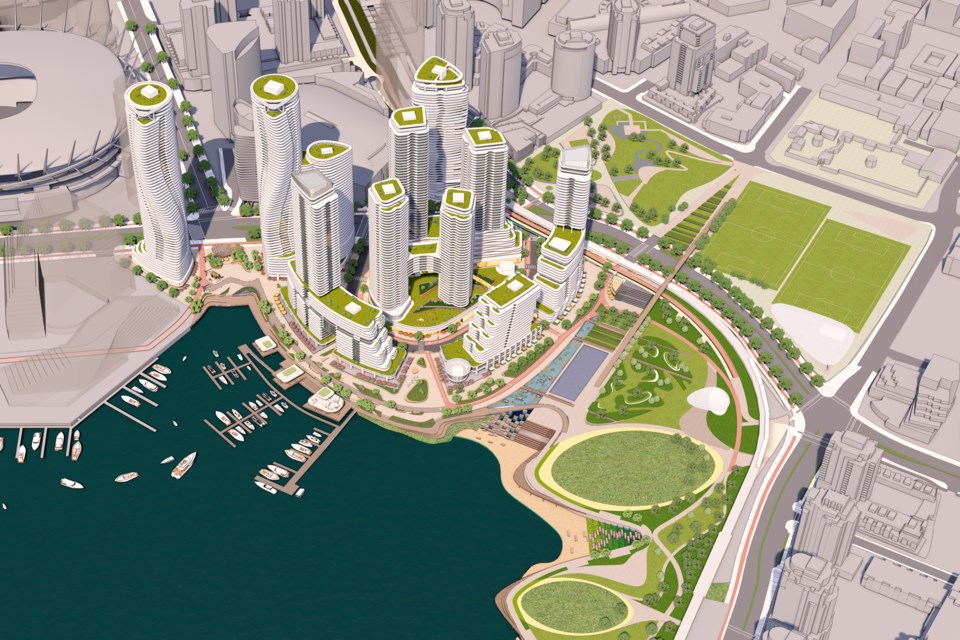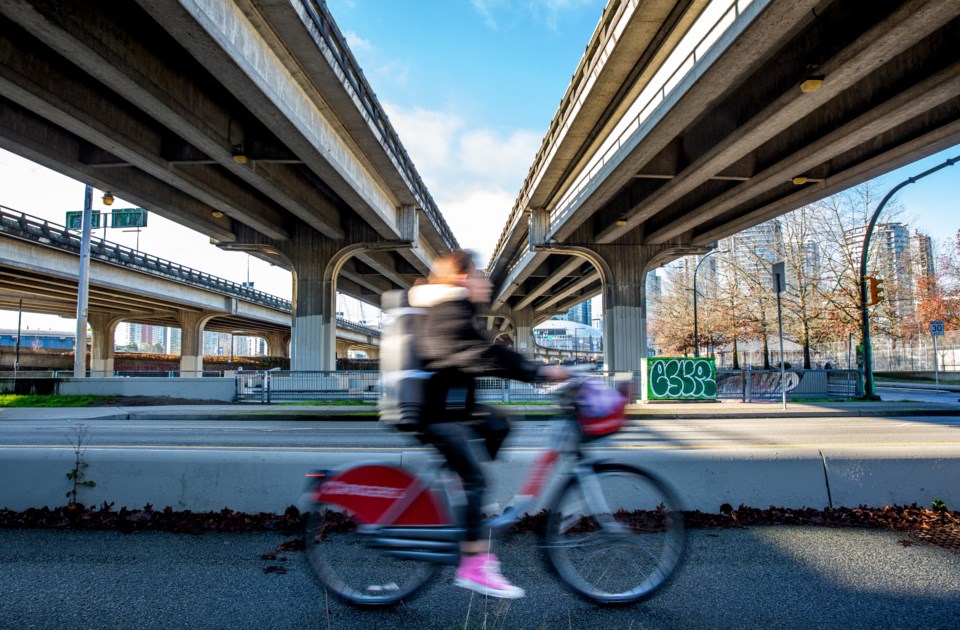Will Vancouver’s Georgia and Dunsmuir viaducts ever be demolished?
That question was partly answered in October 2015 when the Gregor Robertson-led city council voted 5-4 to remove the hulking structures, which were built in the 1970s as part of a failed freeway plan.
Council’s vote was based on a plan recommended by city staff that said the viaducts needed up to $65 million in repairs to keep them standing after a moderate earthquake.
Traffic counts also showed the viaducts were underutilized — even at “45,000 person trips by vehicle over a 24-hour period” — and used at less than half of their designed capacity, according to a staff report at the time.
More than two years after that vote, council then approved the ambitious Northeast False Creek plan, which further emphasized the need to remove the elevated roadways.
That plan called for the transformation of 58 hectares of land once home to lumber mills, a ship-building industry and Expo 86 into the equivalent of a town the size of Prince Rupert.
Demolition of the Georgia and Dunsmuir viaducts would allow construction of a new road network through what was then anticipated to be a maze of new highrises and other forms of housing for up to 12,000 people.
Almost 10 years after council’s vote to demolish the viaducts, the structures remain standing and continue to serve motorists, cyclists and pedestrians.
But on Tuesday, Concord Pacific — which owns the majority of the property in the area around the viaducts — announced an update to its development plan for Northeast False Creek, which is expected to trigger removal of the elevated roadways.

'Landmark towers'
Peter Webb, Concord’s senior vice-president of development, said the company is about to embark on the enquiry stage with the city’s planning staff over its “Concord Landing” plan for the area.
The project calls for 5,000 homes over 12 buildings of various scale and shape, including what Webb referred to as “landmark towers,” which could exceed 60 storeys flanking a redesigned West Georgia Street as it descends to False Creek.
The mix of housing is yet to be determined, Webb said.
“As part of the rezoning process, we will be involved in discussions about non-market or subsidized housing solutions, rental opportunities and condominiums,” he said. “All those discussions are yet to take place.”
Webb anticipated talks with the city’s planning staff would eventually lead to a rezoning application and process that could take two to three years before breaking any ground on the development.
“The reality is the viaducts would then need to come down, a new road pattern established the network in place, and then we could develop the properties that are generated from the new layout,” he said, adding that he believed the viaducts could be demolished within the next five years.

View cones
Concord’s project calls for a large promenade-boardwalk at False Creek, featuring a combination of more than 50 small retail shops and restaurants. A floating pavilion, a new seawall extension and 14 acres of park are included in the plan.
Webb said Concord moving forward on the plan was based partly on city council’s recent changes to view cones, which allow for more density and can help address Vancouver’s housing crisis.
Several view cones intersecting Concord’s land have significantly changed, which have impacted the company’s initial plan and building designs from 2018, according to Webb, who noted the city also has $210 million in reserve to pay for demolition of the viaducts.
Concord has committed to $110 million to the city as part of non-market housing agreement, and the owner of the property at the former Plaza of Nations site committed to $100 million as part of a rezoning agreement.
Lon LaClaire, the city’s general manager of engineering services, told Glacier Media in an interview in December that removal of the viaducts hinged largely on Concord and the B.C. Pavilion Corporation (PavCo) developing Northeast False Creek.
PavCo, a provincial Crown corporation, owns BC Place Stadium and property in the area. The City of Vancouver also owns property near Main Street, but that would not be developed until the viaducts are removed.
“We're just really waiting for the key interested parties, which would be Concord Pacific and the province, to seek to develop the land,” LaClaire said.
“And then that would fund the replacement of the viaducts and the new road network, and the parks, and the seawall and everything similar to the way all of the waterfront sites Concord has done all along the north shore of False Creek.”
'Seismically vulnerable'
When council approved the Northeast False Creek plan in 2018, the estimated cost to demolish the viaducts, build a new road network and extend water, sewer and electrical services across the land was $400 million to $500 million.
“It would be probably quite a bit higher because the cost of everything has gone up quite substantially since 2018,” LaClaire said.
“We would only update those costs when we know that the property owners are interested in moving forward. I don't want to do another cost estimate. It's a very expensive exercise.”
Meanwhile, the city continues to spend money on maintaining the viaducts, with LaClaire saying it has cost hundreds of thousands of dollars since council’s decision in 2015 to knock down the elevated roadways.
“But moving forward, we're looking to [spend] millions, actually, because there are certain components on bridges that just have to be replaced on a regular basis,” he said, citing current expansion joint replacement on the Cambie Bridge as an example. “That is something that is due for replacement on the viaduct.”
LaClaire described the viaducts as “seismically vulnerable.”
“If we're going to keep them in the long term, we would have to invest hundreds of millions of dollars in making it so they don't fall onto the SkyTrain and all the roads below and kind of cut off the whole section of the city, including the new hospital, from downtown,” he said.
PavCo, meanwhile, said in an emailed statement this week that it has no immediate development plans for its property adjacent to BC Place Stadium.
“The potential redevelopment of Northeast False Creek represents a significant opportunity for the continued growth of the BC Place Stadium district as a destination for world-class events and entertainment,” PavCo said.
“However, any potential development of these lands is likely several years away due to several factors, including integration with the City of Vancouver's redesign of the Georgia viaduct ramp, consideration for BC Place access and operations, and meaningful consultation with First Nations.”
PavCo noted the lands will also be used for the staging and execution of Vancouver's seven FIFA World Cup 2026 matches.
“We are not anticipating that any further major developments will occur with the Northeast False Creek area until after that time,” the Crown corporation said.
Former city councillor Geoff Meggs voted in 2015 to knock down the viaducts. Meggs posted a message on his Linkedin account Wednesday, saying developing Northeast False Creek will “fix a hole in the heart of the city.”
X/@Howellings





